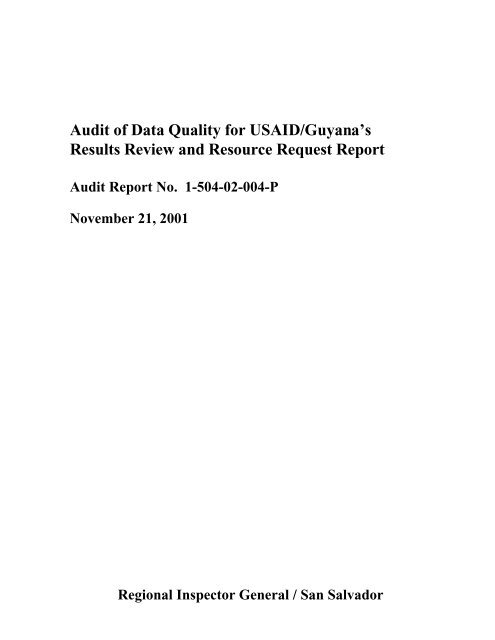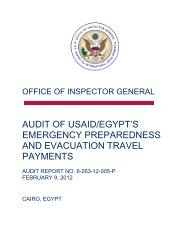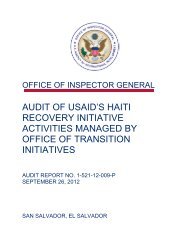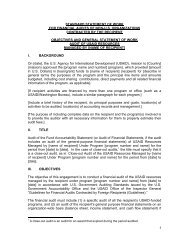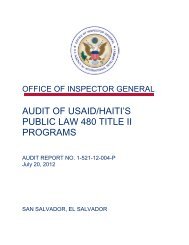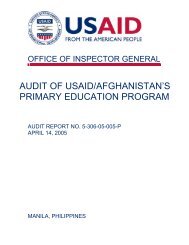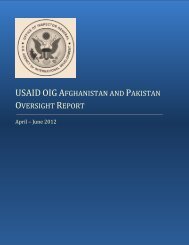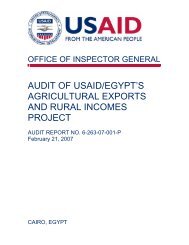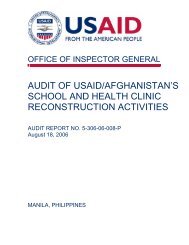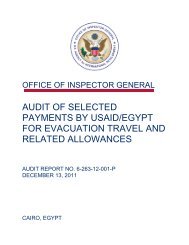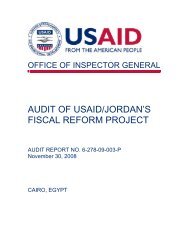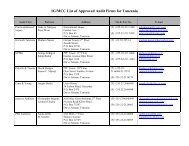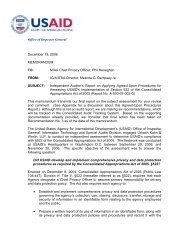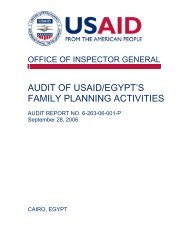Audit of Data Quality for USAID/Guyana's Results Review and ...
Audit of Data Quality for USAID/Guyana's Results Review and ...
Audit of Data Quality for USAID/Guyana's Results Review and ...
Create successful ePaper yourself
Turn your PDF publications into a flip-book with our unique Google optimized e-Paper software.
<strong>Audit</strong> <strong>of</strong> <strong>Data</strong> <strong>Quality</strong> <strong>for</strong> <strong>USAID</strong>/Guyana’s<strong>Results</strong> <strong>Review</strong> <strong>and</strong> Resource Request Report<strong>Audit</strong> Report No. 1-504-02-004-PNovember 21, 2001Regional Inspector General / San Salvador
U.S. Agency <strong>for</strong>INTERNATIONALDEVELOPMENTRIG/San SalvadorNovember 21, 2001MEMORANDUMFOR:FROM:SUBJECT:<strong>USAID</strong>/Guyana Director, Carol R. BeckerRegional Inspector General/San Salvador, Timothy E. Cox<strong>Audit</strong> <strong>of</strong> <strong>Data</strong> <strong>Quality</strong> <strong>for</strong> <strong>USAID</strong>/Guyana’s <strong>Results</strong> <strong>Review</strong> <strong>and</strong>Resource Request Report (Report No. 1-504-02-004-P)This memor<strong>and</strong>um is our report on the subject audit.The report contains no recommendations <strong>for</strong> your action.I appreciate the cooperation <strong>and</strong> courtesy extended to my staff during the audit.1
Table <strong>of</strong>ContentsSummary <strong>of</strong> <strong>Results</strong> 3Background 3<strong>Audit</strong> Objective 3<strong>Audit</strong> Findings 4Did <strong>USAID</strong>/Guyana assess data quality <strong>for</strong> its per<strong>for</strong>manceindicators in accordance with <strong>USAID</strong> policies? 4Management Comments <strong>and</strong> Our Evaluation 5Appendix I – Scope <strong>and</strong> Methodology 6Appendix II – Management Comments 72
Summary <strong>of</strong><strong>Results</strong>The Regional Inspector General/San Salvador conducted an audit to determine if<strong>USAID</strong>/Guyana assessed data quality <strong>for</strong> its per<strong>for</strong>mance indicators in accordancewith <strong>USAID</strong> policies. (See page 3.)<strong>USAID</strong>/Guyana, in accordance with <strong>USAID</strong> policies, assessed data quality <strong>for</strong> the13 per<strong>for</strong>mance indicators presented in the fiscal year 2001 <strong>Results</strong> <strong>Review</strong> <strong>and</strong>Resource Request (R4) report. To overcome a lack <strong>of</strong> reliable in<strong>for</strong>mation inGuyana, mission management hired consultants to design data collectionmethodologies <strong>and</strong> to collect data. <strong>USAID</strong>/Guyana also selected simple indicatorsthat would be easy to verify. (See page 4.)<strong>USAID</strong>/Guyana did not provide comments to the draft report.BackgroundAccording to <strong>USAID</strong>/Guyana’s April 2001 <strong>Results</strong> <strong>Review</strong> <strong>and</strong> Resource Request(R4) report, the mission manages two strategic objectives (SO) <strong>and</strong> one specialobjective (SPO).• SO: 504-001 Exp<strong>and</strong>ed economic opportunities <strong>for</strong> the urban <strong>and</strong> rural poor 1• SO: 504-004 More responsive <strong>and</strong> participatory governance <strong>and</strong> rule <strong>of</strong> law• SPO: 504-003 Improved HIV/AIDS attitudes, knowledge <strong>and</strong> appliedprevention strategies<strong>USAID</strong>/Guyana reported accrued expenditures <strong>of</strong> approximately $2.7 million infiscal year 2001. The mission supported programs to strengthen the businessenvironment in order to bring about more equitable economic growth. It managedef<strong>for</strong>ts to make governance in Guyana more inclusive by increasing the frequency<strong>and</strong> magnitude <strong>of</strong> citizen participation <strong>and</strong> to make the rule <strong>of</strong> law moreresponsive. Finally, it worked to increase Guyana’s HIV/AIDS prevention ef<strong>for</strong>ts<strong>and</strong> slow the rate <strong>of</strong> new infections.<strong>Audit</strong> ObjectiveThe Regional Inspector General/San Salvador included an audit in its fiscal year2001 audit plan to answer the following question:Did <strong>USAID</strong>/Guyana assess data quality <strong>for</strong> its per<strong>for</strong>mance indicators inaccordance with <strong>USAID</strong> policies?Appendix I describes the audit's scope <strong>and</strong> methodology.1 This strategic objective has been renamed since the April 2001 R4 report. It is now entitled “Improved climate <strong>for</strong> privateinvestment.”3
<strong>Audit</strong> FindingsDid <strong>USAID</strong>/Guyana assess data quality <strong>for</strong> its per<strong>for</strong>mance indicators inaccordance with <strong>USAID</strong> policies?<strong>USAID</strong>/Guyana assessed per<strong>for</strong>mance in<strong>for</strong>mation to ensure that data was <strong>of</strong>reasonable quality <strong>and</strong> reviewed data collection, maintenance, <strong>and</strong> processingprocedures.<strong>USAID</strong> policies as specified in ADS 203.3.6.6 require missions to “assess dataquality when establishing the per<strong>for</strong>mance indicators <strong>and</strong> when choosing datacollection sources <strong>and</strong> methods.” Specifically, missions must verify <strong>and</strong> validateper<strong>for</strong>mance in<strong>for</strong>mation to ensure that data are <strong>of</strong> reasonable quality <strong>and</strong> reviewdata collection, maintenance, <strong>and</strong> processing procedures to ensure that they areconsistently applied <strong>and</strong> continue to be adequate.We concluded that <strong>USAID</strong>/Guyana verified <strong>and</strong> validated per<strong>for</strong>mance in<strong>for</strong>mationto ensure that data was <strong>of</strong> reasonable quality <strong>and</strong> reviewed data collection,maintenance, <strong>and</strong> processing procedures <strong>for</strong> the 13 per<strong>for</strong>mance indicators presentedin the fiscal year 2001 R4 report based on the following:• <strong>USAID</strong>/Guyana management determined that reliable data was not availablefrom established data sources in Guyana.• To overcome the lack <strong>of</strong> reliable data related to HIV/AIDS prevalence inGuyana, the mission hired consultants to design data collection methodologies,surveys, <strong>and</strong> evaluation tools that could be used to regularly gather per<strong>for</strong>manceindicator data.• The team leaders <strong>of</strong> the economic growth <strong>and</strong> <strong>of</strong> the democracy <strong>and</strong> governancestrategic objectives selected simple indicators that would be easy to verify.These included counting members <strong>of</strong> the local chambers <strong>of</strong> commerce <strong>and</strong> thepercentage <strong>of</strong> women holding public <strong>of</strong>fice.• We independently assessed the quality, by reviewing documentation at<strong>USAID</strong>/Guyana, <strong>of</strong> the 13 per<strong>for</strong>mance indicators presented in the fiscal year2001 R4 report <strong>and</strong> concluded that they met the quality st<strong>and</strong>ards outlined in theAutomated Directives System (ADS) 203.3.6.3. Specifically, the indicatorswere considered to be useful <strong>for</strong> management; reflected progress at theIntermediate Result or Strategic Objective level; measured change that wasattributable (at least in part) to <strong>USAID</strong>/Guyana ef<strong>for</strong>ts; covered a one-yearperiod; <strong>and</strong> were direct, objective, practical, <strong>and</strong> adequate as defined by ADS203.3.6.5 a.4
Appendix IScope <strong>and</strong>MethodologyScopeThe Regional Inspector General/San Salvador conducted this audit, in accordancewith generally accepted government auditing st<strong>and</strong>ards, to determine if<strong>USAID</strong>/Guyana assessed data quality in accordance with <strong>USAID</strong> policies.We reviewed the management controls used by the mission to ensure that datareported <strong>for</strong> per<strong>for</strong>mance indicators was reliable. These controls includedassessments <strong>of</strong> per<strong>for</strong>mance indicators in connection with preparing strategicframeworks <strong>for</strong> strategic objectives, review <strong>of</strong> indicators when preparingper<strong>for</strong>mance monitoring plans, <strong>and</strong> periodic reviews <strong>of</strong> project progress.We reviewed all 13 per<strong>for</strong>mance indicators presented in the April 2001 <strong>Results</strong><strong>Review</strong> <strong>and</strong> Resource Request (R4) report to determine if assessments <strong>of</strong> dataquality were per<strong>for</strong>med when the indicators were established.The audit was conducted at <strong>USAID</strong>/Guyana from September 24, 2001 throughSeptember 28, 2001.Methodology<strong>USAID</strong> policies as specified in ADS 203.3.6.6 require missions to “assess dataquality when establishing the per<strong>for</strong>mance indicators <strong>and</strong> when choosing datacollection sources <strong>and</strong> methods.” Subsequently, “data quality must be reassessed asneeded, but no less than once every three years.” Specific requirements <strong>for</strong>conducting a data quality assessment in ADS 203.3.6.6 are (1) verify <strong>and</strong> validateper<strong>for</strong>mance in<strong>for</strong>mation to ensure that data are <strong>of</strong> reasonable quality <strong>and</strong> (2) reviewdata collection, maintenance, <strong>and</strong> processing procedures to ensure that they areconsistently applied <strong>and</strong> continue to be adequate.To determine that <strong>USAID</strong>/Guyana assessed data quality in accordance with theabove criteria, we interviewed mission <strong>of</strong>ficials <strong>and</strong> examined e-mails,per<strong>for</strong>mance monitoring plans, strategic frameworks, study proposals, <strong>and</strong> otherdocuments. We also independently assessed in accordance with ADS 203.3.6.3the quality <strong>of</strong> the 13 per<strong>for</strong>mance indicators presented in the <strong>Results</strong> <strong>Review</strong> <strong>and</strong>Resource Request (R4) report.We judged that if 90 percent or more <strong>of</strong> the indicators had assessments <strong>of</strong> dataquality that met the ADS requirements, it would result in an unqualified (positive)opinion. If between 70 to 90 percent <strong>of</strong> the indicators met the st<strong>and</strong>ards, theopinion would be qualified (both positive <strong>and</strong> negative findings). If less than 70percent <strong>of</strong> the indicators had assessments that met the st<strong>and</strong>ards, it would result inan adverse (negative) opinion.6
Appendix IIManagementComments<strong>USAID</strong>/Guyana did not provide comments to the draft report.7


